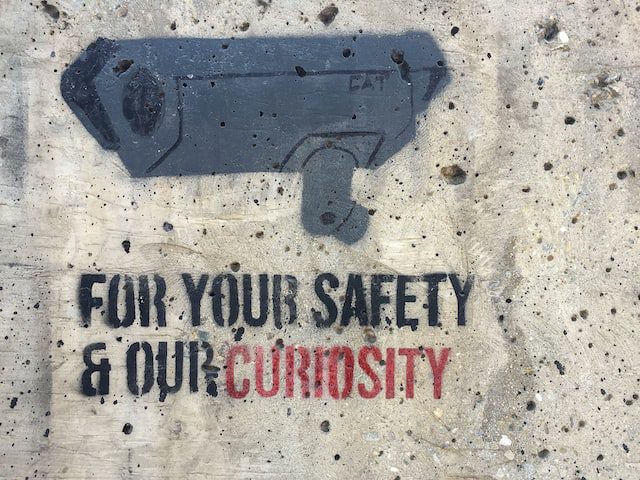
I got really caught up in thinking “deconstruction” was about becoming a better person, some new salvation protocol that I could easily pass through, and sort of amending all the crappy ideas I held onto. Turns out that stepping into this social, antireligious, hashtag movement, you open yourself up to more crappy ideas to hold onto. Ideas that sound really great in the beginning but ultimately end up mirroring the same institutional bull $hit that I was entangled in before.
I was wooed into this idea of stripping down my faith to skin and bones. So that I could be naked and known, by God, myself, and others. Yes! I could be naked and free! I could be me—unapologetically me, honest, vulnerable, authentic. But then, the deconstruction teachers told me that I needed all these shiny new decorations—identities, labels, positions, stances. I was told this is how we act like Jesus. It sure felt like I was covering back up. But they assured me I wasn’t. This is different. It’s nuanced. I was force-fed logical fallacy and told that it was sound.
Leaving the evangelical system of belief, rejecting the Bible, the end of tithing, quitting church, making new friends—all these ideas sounded lovely to me. I had always felt like faith should have felt different than attending school or feeling as if I just paid for a service that I didn’t ask for.
I had imagined that following this deconstruction (of faith and religion) path would lead me to a nutritious life with an abundance of fruits of love and grace. Finally, someone would show me how to be, someone would show me what Jesus looks like in modern times. All I got were words and more homework; more books I had to read, more courses to take, more groups to join, more ideas to pay for. For me, it started feeling like a church again.
Deconstruction is a marketable program. I invested heavily in the program. There was no real return, however. I was taught how to argue outside the confines of formal argumentation and that did not coincide well with the logic courses I was taking during my “deconstruction”—which I highly recommend. I dug into Jacques Derrida after being insulted for not knowing that “deconstruction of religion” came from Derrida’s original idea of understanding the relationship between text and their meanings. This is why religious deconstructionists rely heavily on informing others on original Greek and Hebrew translations when discussing Bible passages.
It wasn’t a total loss, however. While being immersed in the academic competitiveness of deconstruction, I learned a lot of information. I have read a lot of books. I have studied a lot of topics I never imagined I would. This process is truly a remarkable way to begin peeling back the layers of who we truly are so that we can learn by way of curiosity instead of a set of curriculum or doctrine.
Where it falters, however, is in the inability to teach others a practice that fosters relationship building, which is both absent from church and school institutions as well. Religious deconstructionism is just as structured as the institutions it alleges to oppose. The general claim is that deconstruction helps you climb out of the box of evangelicalism, away from sinister eschatology that induces fear. The thing is, you only climb into a box when you claim that “deconstruction” decoration for yourself. It’s just a bigger box. It’s sparkly and covered with glitter and “anti” messages to let others know what you oppose.
Jesus shows us that relationship, not opposition, is the way to the Kingdom: the relationship with ourselves, our loved ones, and the earth—not “the world” but the dirt we came from. In this space, we move from self-loathing “worm theology” to self-loving, grace theology. Relationship building was a part of everything Jesus did. As were proximity and physicality. This is a dimension that is lacking in the deconstruction program.
The orators of deconstruction have found a clever way to over-qualify flimsy connections made by way of building their new church—I mean home church—I mean anti-church— and have found a way to exploit the market in the same way the preachers and pastors of their previous (mega)church establishments have. Jesus never sought other people’s money and here we are, amidst a new atmosphere of the same old shenanigans. Deconstructionism, evangelicalism, the church institution, all find ways to turn Jesus and Christianity into a transaction instead of a relationship. You must pay to discover how to have a relationship with God. Sound familiar? Sound like something the program of deconstruction claims to oppose, doesn’t it?
In the temple courts he found people selling cattle, sheep and doves, and others sitting at tables exchanging money. So he made a whip out of cords, and drove all from the temple courts, both sheep and cattle; he scattered the coins of the money changers and overturned their tables. To those who sold doves he said, “Get these out of here! Stop turning my Father’s house into a market!” (John 2:14-16, NIV)
It’s different, they say, the deconstructionist authors and orators that want you to listen to all they have to say, while humbly saying they don’t do it for the money but totally appreciate it. The disciples of deconstruction have simply accepted that there’s a clear distinction between the types described in the verse to the idols they now worship. Their progressive way of collecting money on behalf of their teachings of Jesus is simply so they can continue to serve you at a pay cut. Circular logic is the predominant logic utilized by deconstructionists all the while claiming it was truly the evangelicals who used this form of argumentation. Actually, it’s two sides of the same coin.
Deconstruction, they assuredly tell you, is about tearing down the ideas and systems that have kept you captive to conformity. And they tell you over and over and over and over again. Church hurt is reiterated in their rhetoric, and here’s a book on how to heal from church hurt. Every book, every podcast, every video is all about why we need to tear down the structures that enslaved us. Only, it’s just redundant rhetoric with no plan of action. How do I tear it down? Why it’s simply by believing something different, reading a new book, and listening to another podcast, don’t you know? And right now, you can obtain that belief for a discount. I have a new course coming out. Transaction.
I also observed that this process of deconstruction was focused on finding new groups of people to hurl attacks at, new people to essentially hate. New people must be reminded of a social punishment that awaits them should they not join the bandwagon of righteousness. Penal atonement theory—totally false. Punishment/reward system—not of God. But here in the progressive circle of deconstruction, boycotts and cancellations await you. God won’t punish you, but we will. Transaction.
New articles must be written about what the Apostle Paul was really saying in 1 Corinthians. Well, I thought I wasn’t supposed to worry so much about the Bible? I thought a book can’t show me how to be like Jesus?
No, you see, first, you need to understand why the translations are interpreted the way they are, then you need to understand what the times were like during Jesus’ time so that you can see why those words were used. Then you need to buy this book that I wrote to further understand why that verse isn’t really discussing homosexuality. Then you need to listen to my YouTube video (for my subscribers) so that you can really learn why Jesus wasn’t literally saying that he was bringing a sword and is anti-gun ownership.
After you consume all that information, then you can pick from these labels that we endorse to identify yourself with so that others know you are more progressive and enlightened than others are. And then you can help promote my next book by dedicating all your time, not to putting love into action, but by leaving me an Amazon review and sharing a link to my book after you have already agreed to purchase it after you have read it for free. Then, please continue to promote my book with all your free time, and by the way, would you share my podcast and blog link too?
Transaction.
Many will tell you that they aren’t exploiting the church but hey, they need to eat. It’s not like they are asking you for much, it’s just $1 or $5, you spend that on a cup of coffee every day and you know it. So, why not pay me to be my friend on Facebook and because you follow me on Twitter. And because you can afford to contribute to them eating with a measly $5 a month, you subscribe and contribute monthly to their crowdfunding site, all the while proclaiming to the world how you quit tithing. Transaction.
I said that I wasn’t going to attend church every week to hear some white man (the new enemy of Christians, by the way) talk to me about things that he hasn’t even experienced because I was convinced that experience matters. But there I was, every time one of these deconstruction orators asked me to watch their live streams, listening to the opinions of white men who have no relatable experience to reveal to anyone. Do you ever notice that? All they have are more words, no one wants to share personal experiences, just surface examples pulled from the Bible or headlines. I wasn’t only giving them money, I was giving them something more important than that, my attention. I didn’t really change my practice though. I just listened to different white men. And none of them were actually interested in developing a relationship with me, only my bank account. Transaction.
Why do we do that? Why do we fall back into these patterns? Because what we say we believe doesn’t have to match our actions in this cyber reality that we’ve created for ourselves. No one can see that we aren’t walking our talk. We curate a character of love for the Gram. No one can see that we aren’t really putting love into action because we call every interaction “love” or “connection.” We make false claims and say that we really can develop meaningful relationships online without ever meeting someone. Jesus met people in person. He spoke to people face-to-face. Why do we think that dynamic will change? Hello! He was telling his disciples that the mass marketing of religion in his day was problematic. It wasn’t personal and it wasn’t concerned with relationship building. Religion is anti-relationship. Deconstructionism is the same thing. And it’s anti-everything lately.
Deconstruction is simply another religion. And I said I left religion behind when I started “deconstructing” in the first place.
I am saying what I have to say about this matter now and then I will move forward—unlike what deconstructionism is about, which is staying locked in anger and contempt for the system you left behind.
I will be sharing actual practices, for free, that I believe will encourage relationship-building skills. Skills that you can put into practice with the people that matter to you so that you don’t have to listen to people you may never meet (including me) over and over. This way, your orthopraxy will match your orthodoxy and you don’t have to worry about appearing like a hypocrite and trying to find ways to justify your blatant contradictions.
Here’s to living for a living and not deconstructing for a living. Cheers!











